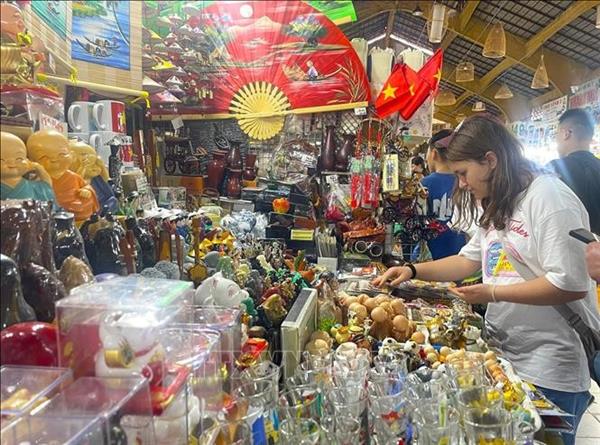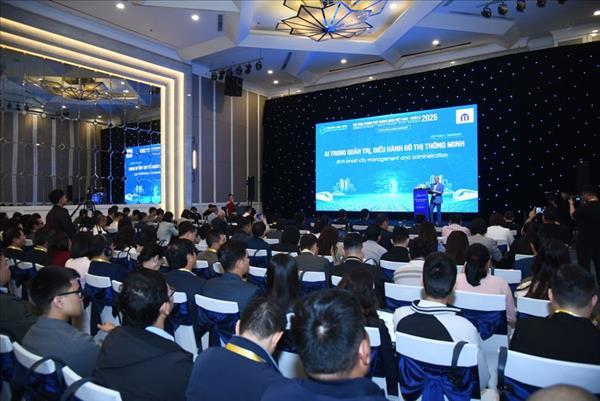Vietnamese small-and medium-sized enterprises (SMEs) are focusing more and more on international trade via e-commerce.
The Department of E-commerce and Digital Economy under the Ministry of Industry and Trade (MoIT) said that e-commerce is suitable for SMEs as it can save costs and directly connect buyers with sellers.
Vietnam is one of the countries that has experienced the fastest growth of e-commerce, at 35 percent annually, 2.5 times higher than Japan.
The bloom of e-commerce has aided the development of cross-border e-commerce since up to 33 percent of online customers have purchased products from abroad.
Dat Phan, Director of Fado.vn, a cross-border e-commerce platform in Vietnam, attributed the development of cross-border e-commerce in the country to increasing consumption demand of Vietnamese people and SMEs’ efforts to reach foreign markets.
Lai Viet Anh, deputy head of the Department of E-commerce and Digital Economy, noted that financial resources have been used to help enterprises improve their capacity for e-commerce.
Up to 70 percent of 800 export businesses surveyed by the department are SMEs and the remainder are big enterprises.
The survey also revealed that 54 percent of the big enterprises use websites and e-transactions while this number among SMEs stands at 36 percent.
Only 11 percent of the businesses have joined foreign e-commerce platforms.
However, 42 percent of the enterprises reported that the total value of their online orders makes up half of their accumulated export turnover.
Tran Thanh Hai, deputy head of the Export-Import Department under the MoIT said cross-border e-commerce is huge globally and Vietnamese businesses should grasp opportunities generated in this area.
The Vietnam E-commerce Association suggested retail businesses conduct cross-border e-commerce via major platforms like Amazon and Alibaba, aiming to participate in the global value chain.
Hai described e-commerce as a solution to improve competitiveness of businesses, asking them to take the initiative to join the process.
To promote cross-border e-commerce, the MoIT has applied various solutions to support export activities.
Apart from developing favourable policies for e-commerce, the ministry will focus on administrative reform and create the best conditions for enterprises to participate in international exhibitions, fairs and forums.
The Department of E-commerce and Digital Economy has also launched an e-commerce portal to support Vietnamese exporters.
Total cross-border online transaction value is expected to hit 900 billion USD globally by 2020, making up 22 percent of global e-commerce value.
The Department of E-commerce and Digital Economy under the Ministry of Industry and Trade (MoIT) said that e-commerce is suitable for SMEs as it can save costs and directly connect buyers with sellers.
Vietnam is one of the countries that has experienced the fastest growth of e-commerce, at 35 percent annually, 2.5 times higher than Japan.
The bloom of e-commerce has aided the development of cross-border e-commerce since up to 33 percent of online customers have purchased products from abroad.
Dat Phan, Director of Fado.vn, a cross-border e-commerce platform in Vietnam, attributed the development of cross-border e-commerce in the country to increasing consumption demand of Vietnamese people and SMEs’ efforts to reach foreign markets.
Lai Viet Anh, deputy head of the Department of E-commerce and Digital Economy, noted that financial resources have been used to help enterprises improve their capacity for e-commerce.
Up to 70 percent of 800 export businesses surveyed by the department are SMEs and the remainder are big enterprises.
The survey also revealed that 54 percent of the big enterprises use websites and e-transactions while this number among SMEs stands at 36 percent.
Only 11 percent of the businesses have joined foreign e-commerce platforms.
However, 42 percent of the enterprises reported that the total value of their online orders makes up half of their accumulated export turnover.
Tran Thanh Hai, deputy head of the Export-Import Department under the MoIT said cross-border e-commerce is huge globally and Vietnamese businesses should grasp opportunities generated in this area.
The Vietnam E-commerce Association suggested retail businesses conduct cross-border e-commerce via major platforms like Amazon and Alibaba, aiming to participate in the global value chain.
Hai described e-commerce as a solution to improve competitiveness of businesses, asking them to take the initiative to join the process.
To promote cross-border e-commerce, the MoIT has applied various solutions to support export activities.
Apart from developing favourable policies for e-commerce, the ministry will focus on administrative reform and create the best conditions for enterprises to participate in international exhibitions, fairs and forums.
The Department of E-commerce and Digital Economy has also launched an e-commerce portal to support Vietnamese exporters.
Total cross-border online transaction value is expected to hit 900 billion USD globally by 2020, making up 22 percent of global e-commerce value.
VNA/VNP

















